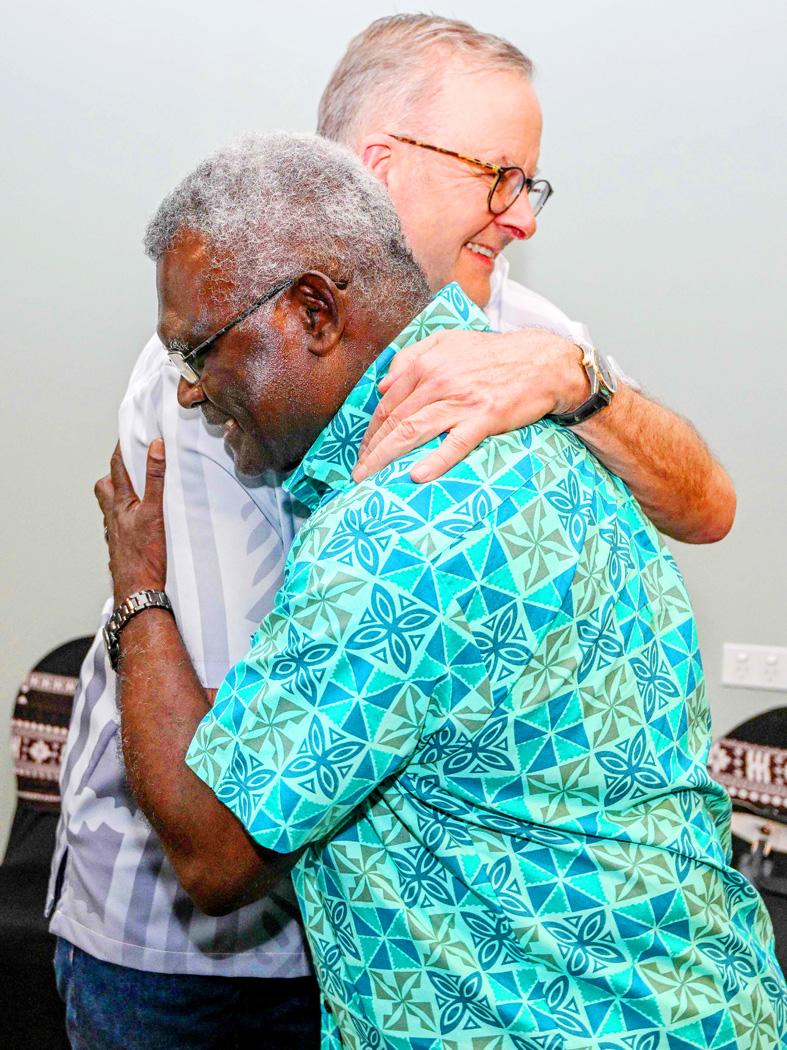Solomon Islands Prime Minister Manasseh Sogavare has guaranteed there would never be a Chinese military base in his country, saying that any such deal with Beijing would undermine regional security, make the Pacific state an “enemy,” and “put our country and our people as targets for potential military strikes.”
He has also said that Australia remains the “security partner of choice” for Solomon Islands and he would only call on China to send security personnel to the country if there was a “gap” that Canberra could not meet.
Speaking exclusively to the Guardian, Radio New Zealand and Solomon Islands Broadcasting Corp in his first media interview since signing the controversial security deal with China earlier this year, Sogavare said it was time for the world to “trust us.”

Photo: AFP
“Let me assure you all again, there is no military base, nor any other military facility, or institutions in the agreement. And I think that’s a very important point that we continue to reiterate to the family in the region,” he said.
News of the deal with China sparked huge concern among Western countries, particularly language in the text saying China would be permitted to “make ship visits.”
However, Sogavare pushed back against claims it would lead to a military base in the country, which lies less than 2,000km from Australia’s east coast.
“I have said it before and I will say it again, that is not in someone’s interest, nor the interest of the region for any military base, to be established in any Pacific island country, let alone Solomon Islands,” he said.
“I think the reason is simple; the reason is regionalism, the moment we establish a foreign military base, we immediately become an enemy. And we also put our country and our people as targets for potential military strikes,” he said.
Sogavare added that Chinese security personnel would only be invited to the Solomon Islands by the Solomon Islands government if Australia could not meet the requests for security assistance from the government.
“If there is any gap, we will not allow our country to go down the drain. If there is a gap, we will call on support from China, but we’ve made it very clear to the Australians, and many times when we have this conversation with them, that they are a partner of choice ... when it comes to security issues in the region, we will call on them first,” he said.
However, the assurances seem at odds with comments made by Sogavare last week, in which he praised China as a “worthy partner,” while saying relationships with some countries “at times can sour,” in an apparent reference to Australia.
He also said he wanted China to play a permanent role in training police in his country, and welcomed donations of police vehicles and drones from Beijing.

MAKING WAVES: China’s maritime militia could become a nontraditional threat in war, clogging up shipping lanes to prevent US or Japanese intervention, a report said About 1,900 Chinese ships flying flags of convenience and fishing vessels that participated in China’s military exercises around Taiwan last month and in January have been listed for monitoring, Coast Guard Administration (CGA) Deputy Director-General Hsieh Ching-chin (謝慶欽) said yesterday. Following amendments to the Commercial Port Act (商港法) and the Law of Ships (船舶法) last month, the CGA can designate possible berthing areas or deny ports of call for vessels suspected of loitering around areas where undersea cables can be accessed, Oceans Affairs Council Minister Kuan Bi-ling (管碧玲) said. The list of suspected ships, originally 300, had risen to about 1,900 as

Japan’s strategic alliance with the US would collapse if Tokyo were to turn away from a conflict in Taiwan, Japanese Prime Minister Sanae Takaichi said yesterday, but distanced herself from previous comments that suggested a possible military response in such an event. Takaichi expressed her latest views on a nationally broadcast TV program late on Monday, where an opposition party leader criticized her for igniting tensions with China with the earlier remarks. Ties between Japan and China have sunk to the worst level in years after Takaichi said in November that a hypothetical Chinese attack on Taiwan could bring about a Japanese

Right-wing political scientist Laura Fernandez on Sunday won Costa Rica’s presidential election by a landslide, after promising to crack down on rising violence linked to the cocaine trade. Fernandez’s nearest rival, economist Alvaro Ramos, conceded defeat as results showed the ruling party far exceeding the threshold of 40 percent needed to avoid a runoff. With 94 percent of polling stations counted, the political heir of outgoing Costa Rican President Rodrigo Chaves had captured 48.3 percent of the vote compared with Ramos’ 33.4 percent, the Supreme Electoral Tribunal said. As soon as the first results were announced, members of Fernandez’s Sovereign People’s Party

MORE RESPONSIBILITY: Draftees would be expected to fight alongside professional soldiers, likely requiring the transformation of some training brigades into combat units The armed forces are to start incorporating new conscripts into combined arms brigades this year to enhance combat readiness, the Executive Yuan’s latest policy report said. The new policy would affect Taiwanese men entering the military for their compulsory service, which was extended to one year under reforms by then-president Tsai Ing-wen (蔡英文) in 2022. The conscripts would be trained to operate machine guns, uncrewed aerial vehicles, anti-tank guided missile launchers and Stinger air defense systems, the report said, adding that the basic training would be lengthened to eight weeks. After basic training, conscripts would be sorted into infantry battalions that would take